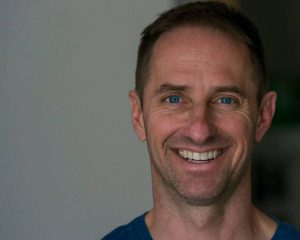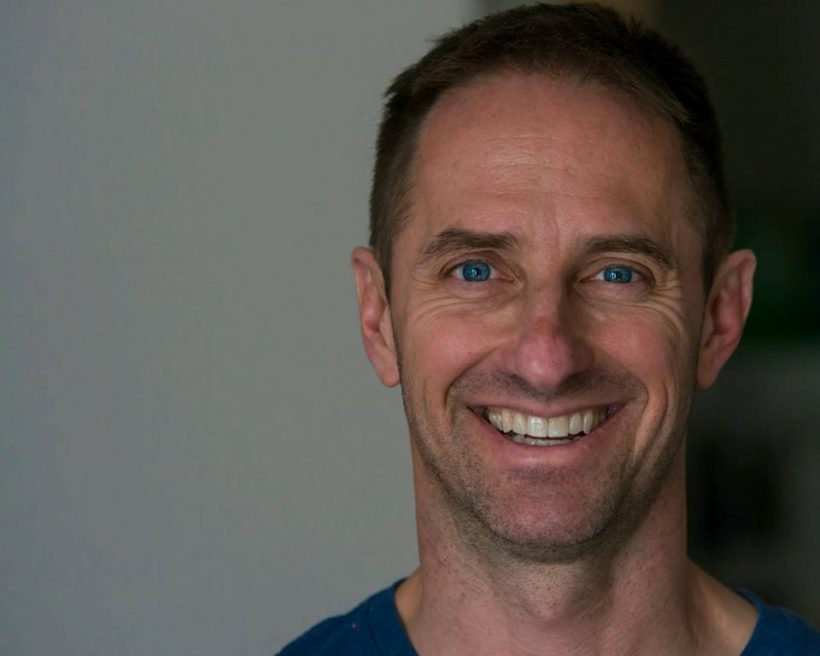 Ron Blake is much more than a sexual assault and PTSD. He graduated with an MPA in Public Affairs from Indiana University, was elected as a city councilman in suburban Chicago at a young age, was a high school physics teacher, and worked with hundreds of students as a high school cross country and track coach for 15 seasons.
Ron Blake is much more than a sexual assault and PTSD. He graduated with an MPA in Public Affairs from Indiana University, was elected as a city councilman in suburban Chicago at a young age, was a high school physics teacher, and worked with hundreds of students as a high school cross country and track coach for 15 seasons.
Blake was born in Gary, IN and has lived in Phoenix for the last 13 years. His parents, Ron and Rita are retired educators. He has a sister Kris and three brothers: Scott, Matt, and Mark. His parents and brothers live in Indiana (Chicago suburbs) and his sister lives in San Diego.
Blake has lived in Los Angeles, San Diego, and England too.
JRK: Before we get into the interview can you tell readers a bit about yourself, where you are from, and all that good stuff?
RB: I was born in Gary, Indiana and grew up most of my life in the Chicago suburbs. My mom and dad (Ron and Rita) and my three brothers (Scott, Matt, and Mark) still live in Chicagoland. My sister (Kris) lives in San Diego. And I have lived in Phoenix for the last 14 years. I’ve also lived in San Diego, Los Angeles, and England. I am a distance runner. I like anything weather related. I eat lots of Chipotle and Subway. I have seen all of the American Film Institute’s top 100 movies of all time. I worked for Sandra Bullock one summer. I was once a high school physics teacher. I love peanut M & M’s. And I’m learning Spanish.
JRK: You experienced a trauma that no one can really understand unless it happens to them. You were raped by 3 men while at home asleep and sick. Can you tell us about the incident?
RB: That incident caused so much physical and emotional trauma for me. I knew all three of the men involved in the sexual assault. One of them was someone who was my best friend and so much more to me. I wrote a powerful story called Two Emotions that describes the betrayal I experienced on that night. It is hard to explain what it feels like to go through a moment like that. This story was a chance for me to try and use words and share that experience of that trauma with others.
JRK: The police, after their investigation, simply wrote the incident off as 4 gay men playing while drunk. Obviously, that was not the case. How did you feel when the police minimized what happened to you?
RB: I had anger over how the Phoenix Police treated me that night. A lot of anger that manifested itself as a symptom of PTSD over time. I was held down and sexually assaulted while I was sick and asleep. I almost lost my life struggling to get away. I was bleeding. Upon arrival, the police said they recognized one of my perpetrators as someone they knew and considered him dangerous. All three men were drunk. I informed the police I was attacked and my clothes were taken off of me. And yet everything was dismissed as just a big misunderstanding with a bunch of gay men who had too much to drink. The Phoenix Police even took the most dangerous of the perpetrators back to his home that night from my understanding of the events the following day. I experienced two traumas that night. One involving the three men. And one involving the Phoenix Police.
JRK: Why do you think there is difficulty grasping the fact that men can be raped too, just as women are?
RB: Society does not discuss the rapes of men like they do with women. There is a toxic masculinity that impedes the ability for all of us to fully embrace that sexual assault happens to…people. And thus many men are not willing to come forward and discuss their sexual assaults.
JRK: You have stated that there is a stigma attached to male sexual assault. Can you explain what you mean by that?
RB: Guys are expected to be tough. Sexual assault is not something that many men are going to want to discuss if it occurs. So there is indeed a stigma attached to male sexual assault. Thus…silence. And that silence is so destructive for the health and well-being of a male who is sexually assaulted.
JRK: Self-empowerment often comes as a result of a horrific experience. Since your incident, you have been on a cross-country journey to open up the discussion about male sexual assault. What has that entailed and has it been an empowering experience for you?
RB: This journey to get on The Late Show and open up discussions about these important issues with tens of thousands of strangers has been amazing. I encourage people to watch the TEDx talk I gave about this journey and to also view the Emmy nominated documentary produced by a group of students about all of this. They are on the website BlakeLateShow.com. This journey has most certainly been empowering me and others. This is about us. Not the perpetrators of our sexual assaults.
JRK: You have said you had an “a-ha” moment where you were watching Steven Colbert. It was at that point while watching the show you decided you would embrace the power of laughter and get on the show. What was that “a-ha” moment all about and how have your efforts progressed to get on the show?
RB: I had that moment of laughter on that suicidal night 32 months ago. The most significant thing about that moment was not that I laughed at that Stephen Colbert joke. It was that I recognized that I laughed. I paused the TV for about three minutes. It was such an incongruous moment. Suicidal. Laughter. I went with the pure emotion of an eight-year-old kid and told myself I was using that laughter…and I was getting on The Late Show as a guest. I was going to tell my story. I wasn’t going to hide anymore I went to bed with hope that night for the first time in years. The next morning the idea to meet strangers with Sharpie markers and poster boards found its Ah-ha moment.
JRK: Has there been any outreach to you on the part of the show yet?
RB: I and many others have reached out to the show. Nothing yet. I think it will take word of mouth and a continued effort from everyone on social media. This project has become a massive incredible collective story of hope, support, love, and laughter. That is how we will get on the show. It will take a massive collective effort of getting the story out there. Get Blake and the tens of thousands of messages on the show. This is much bigger than just me. A collective voice will get this accomplished. Finally.
JRK: Since you have opened up about your sexual assault, have you found others that have experienced the same thing?
RB: Over 1,300 strangers have shared their personal stories of sexual assault with me on this 959 day cross country journey. It is so cool to see what happens when you are willing to be vulnerable. It allows others to do the same. That is how we heal from our traumas. When we start talking and sharing.
JRK: Now that the issue of sexual assault has been brought to the forefront with the “Me Too” Movement, do you feel male sexual assault is being given the same attention within that movement as female sexual assault?
RB: The more we include males in our sexual assault discussions; the more likely it will be given the proper attention. It happens to anyone.
JRK: Do you have any parting thoughts you would like to leave Diversity Rules readers?
RB: I would encourage readers of Diversity Rules to share my website with friends. It truly is a collective story of the human spirit. There are photos on the website of most of the giant foam poster boards with so many of the 25,431 messages in 87 languages that include artwork, poetry, jokes, short stories, bible verses, etc. There are also photos on there of over 4,000 people of all walks of life I have met on this journey.
We achieve so little alone. But we are able to achieve great things when we work together. Let’s keep going until we get on The Late Show and celebrate this journey of hope, support, love, and laughter. I’ve said that comedy is not the absence of trauma. It is the ability to take our traumas and find a way to still laugh. We will do that together with Stephen Colbert!
__________________________________________________
If you enjoy reading Diversity Rules Magazine, please consider subscribing, advertising or investing in its future.


Is there a police report for this? Would be curious if he ever filed one or initiated prosecution.
Yes, if I remember correctly, he did, and the police made fun of him. They did not believe that a man could be “raped.” They simply saw it as a love tryst gone wrong.
As per the interview:
“JRK: The police, after their investigation, simply wrote the incident off as 4 gay men playing while drunk. Obviously, that was not the case. How did you feel when the police minimized what happened to you?
RB: I had anger over how the Phoenix Police treated me that night. A lot of anger that manifested itself as a symptom of PTSD over time. I was held down and sexually assaulted while I was sick and asleep. I almost lost my life struggling to get away. I was bleeding. Upon arrival, the police said they recognized one of my perpetrators as someone they knew and considered him dangerous. All three men were drunk. I informed the police I was attacked and my clothes were taken off of me. And yet everything was dismissed as just a big misunderstanding with a bunch of gay men who had too much to drink. The Phoenix Police even took the most dangerous of the perpetrators back to his home that night from my understanding of the events the following day. I experienced two traumas that night. One involving the three men. And one involving the Phoenix Police.”